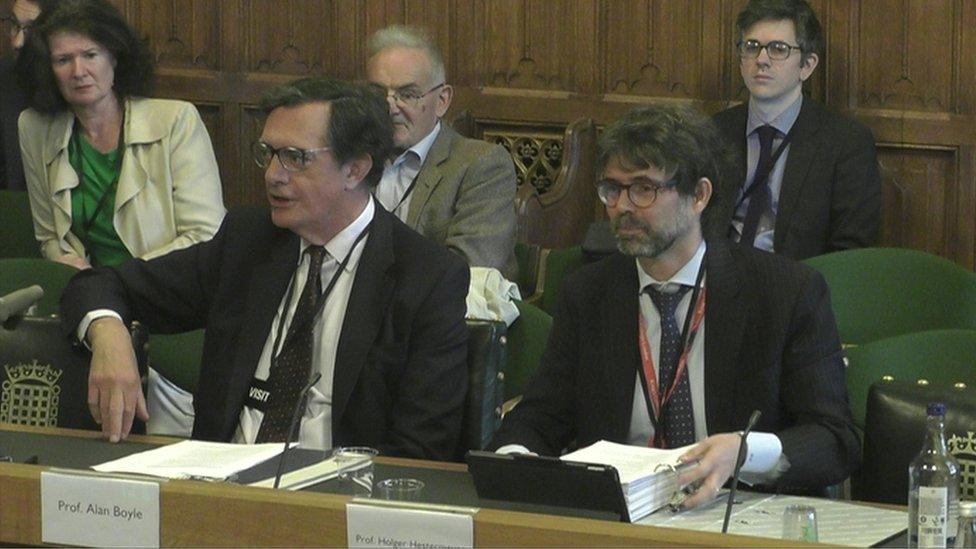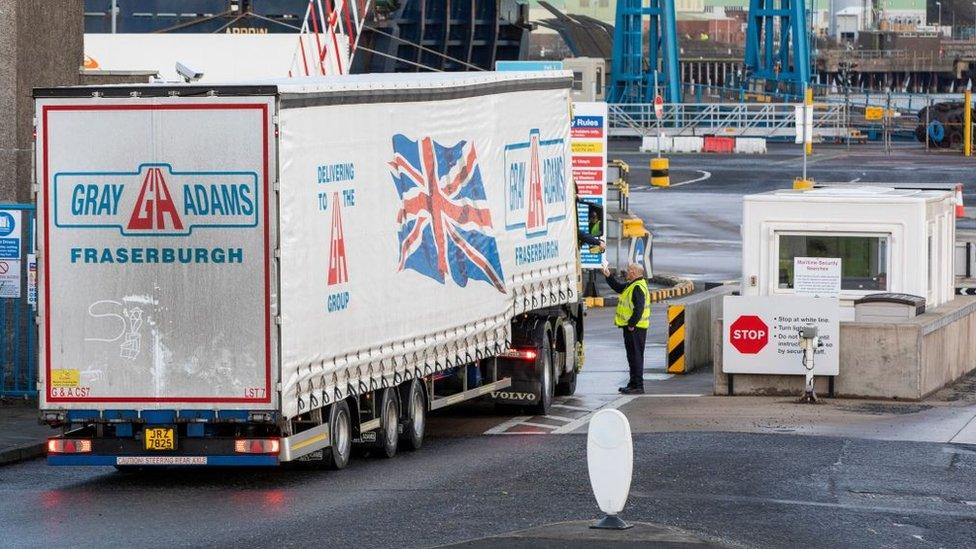Brexit: Experts raise legal doubts about UK's protocol plan
- Published

Some unionists have protested against the protocol
There are serious doubts about the government's justification for unilaterally overriding the Northern Ireland Protocol, legal experts have told MPs.
The protocol is the Brexit deal for NI which the UK and EU agreed in 2019.
The government has cited the international legal concept of 'necessity' for changing the terms.
Prof Alan Boyle told the NI Affairs Committee he was aghast at the government's argument.
Unionist politicians have protested against the protocol, which kept Northern Ireland aligned with the EU single market for goods to allow the continuation of free trade across the Irish border.
It has, however, in turn led to additional checks on some goods moving from Great Britain to Northern Ireland which unionists argue undermines the region's place in the UK.
As part of its demonstration, the Democratic Unionist Party (DUP) has blocked the formation of Northern Ireland's assembly and governing executive until changes are made.
'Shooting herself in the foot'
Prof Boyle said the intention to override the deal would be permitted in international law if the government used Article 16 of the protocol, something it has not done.
This article is the provision which allows parts of the protocol to be unilaterally suspended if they are causing serious difficulties.
Instead, the government is introducing a new law which would remove large parts of the protocol from UK law.
Generally, states cannot use domestic law to override commitments they have made in international treaties.
However, the government has cited 'necessity' - a term used in international law to justify situations where the only way a state can safeguard an essential interest is by the non-performance of an international obligation.

The academics gave evidence to the NI Affairs Committee on Wednesday
Prof Boyle, a barrister and expert in international law, said he was aghast when he heard Foreign Secretary Liz Truss citing necessity.
"Necessity is a defence to a breach of international law so it's only relevant if you're already breaking international law," he said.
"Can you imagine counsel for the UK in arbitration being faced with the other side saying: 'The Foreign Secretary has admitted there is a breach of international law'.
"She is really shooting herself in the foot. Somebody needs to talk to her."
However, he said that that in his view the government's bill does not violate international law because Article 16 permits derogation.
"I read the bill as laying the groundwork for a notice of derogation from a limited number of articles," he explained.
"Article 16 allows them to do so where they consider it necessary where there are societal difficulties.
"If the collapse of power-sharing in Northern Ireland isn't a societal difficulty, I don't know what is."
'Available avenues'
Prof Holger Hestermeyer, from King's College London, also warned the government faced difficulties under several of the conditions needed for citing necessity.
For example, he said a lot of attempts to use necessity had failed because the actions taken under necessity must be the only way to safeguard a state's interests.
He said further negotiations as well as Article 16 are "available avenues'" to the government.
He added that Article 16 would, in legal terms, be a "far better approach" than necessity.

The protocol led to inspections at ports on certain goods imported into Northern Ireland from Great Britain
Meanwhile, polling carried out by LucidTalk for Queen's University Belfast (QUB) suggests a majority of people in Northern Ireland continue to support the protocol.
In response to the statement 'the protocol is on balance a good thing for NI' 53% of respondents agreed, 37% disagreed and 10% were neutral or had no opinion.
The polling was carried out between 3-6 June, which was after the assembly election, but before the government's protocol bill was published.
The sample size was just under 1,500 with a margin of error of +/- 2.3%.
This is the fifth protocol poll carried out by LucidTalk/QUB and shows that support for the protocol has been steady at about 50% since October 2021.
Parties in favour of the protocol won a majority of seats in may's assembly election.
The European Commission's lead Brexit negotiator, Maroš Šefčovič, is expected to reiterate, during a speech in London on Wednesday evening, that the EU's door remains open for negotiations on the protocol.
It is anticipated he will outline commission plans to "smooth" the protocol's operation which would bring "stability" and "legal certainty".
Speaking ahead of the event, he said there had to be "good political will" for future talks and described the government's bill as an "unacceptable" breach of international law.
Related topics
- Published2 February 2024

- Published27 June 2022

- Published13 June 2022

- Published13 June 2022
